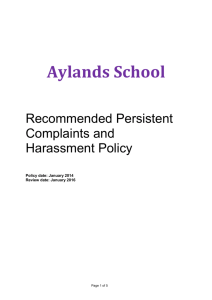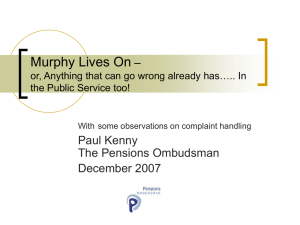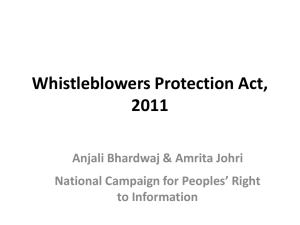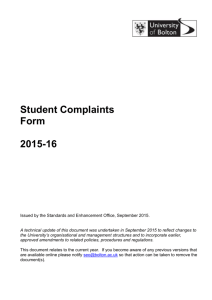Vexatious Complaints Policy - Hambridge Community Primary School
advertisement
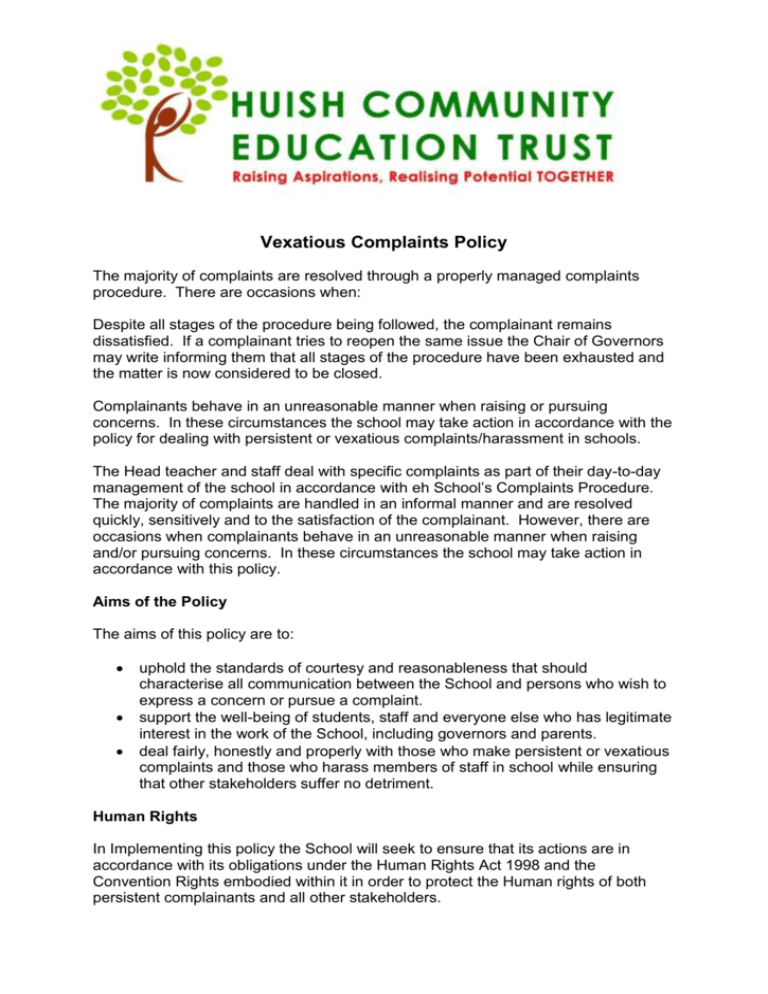
Vexatious Complaints Policy The majority of complaints are resolved through a properly managed complaints procedure. There are occasions when: Despite all stages of the procedure being followed, the complainant remains dissatisfied. If a complainant tries to reopen the same issue the Chair of Governors may write informing them that all stages of the procedure have been exhausted and the matter is now considered to be closed. Complainants behave in an unreasonable manner when raising or pursuing concerns. In these circumstances the school may take action in accordance with the policy for dealing with persistent or vexatious complaints/harassment in schools. The Head teacher and staff deal with specific complaints as part of their day-to-day management of the school in accordance with eh School’s Complaints Procedure. The majority of complaints are handled in an informal manner and are resolved quickly, sensitively and to the satisfaction of the complainant. However, there are occasions when complainants behave in an unreasonable manner when raising and/or pursuing concerns. In these circumstances the school may take action in accordance with this policy. Aims of the Policy The aims of this policy are to: uphold the standards of courtesy and reasonableness that should characterise all communication between the School and persons who wish to express a concern or pursue a complaint. support the well-being of students, staff and everyone else who has legitimate interest in the work of the School, including governors and parents. deal fairly, honestly and properly with those who make persistent or vexatious complaints and those who harass members of staff in school while ensuring that other stakeholders suffer no detriment. Human Rights In Implementing this policy the School will seek to ensure that its actions are in accordance with its obligations under the Human Rights Act 1998 and the Convention Rights embodied within it in order to protect the Human rights of both persistent complainants and all other stakeholders. Parents’ expectations of the school: Parents/carers/members of the public who raise either informal or formal issues or complaints with the School can expect the School to: a) regularly communicate to parents/carers in writing: i. how and when problems can be raised with the School ii. the existence of the School’s complaints procedure, and iii. the existence of the Policy for dealing with Persistent or Vexatious Complaints and/or Harassment in Schools. b) Respond within a reasonable time c) Be available for consultation within reasonable time limits bearing in mind the needs of the pupils/students within the school and the nature of the complaint d) Respond with courtesy and respect e) Attempt to resolve problems using reasonable means in line with the school’s complaints procedure, other policies and practice and in line with guidance and advice from the LA. f) Keep complainants informed of progress towards a resolution of the issues raised. The School’s expectations of parents/carers/members of the public The school can expect parents/carers/members of the public who wish to raise problems with the School to: a) Treat all school staff with courtesy and respect b) Respect the needs and well-being of pupils and staff in the School c) Avoid any use, or threatened use, of violence to people or property d) Avoid any aggression or verbal abuse e) Recognise the time constraints under which members of staff in schools work and allow the School a reasonable time to respond f) Recognise that resolving a specific problem can sometimes take some time g) (in the case of a complaint) follow the School’s complaints procedure. Who is a persistent or vexatious complainant? For the purpose of this policy, a persistent complainant is a parent/carer or member of the public who complains about issues, either formally or informally, or frequently raises issues that the complainant considers to be with the remit of the School and whose behaviour is unreasonable. Such behaviour may be characterised by: a) Actions which are obsessive, persistent, harassing, prolific, repetitious b) Prolific correspondence or excessive e-mail or telephone contact about a concern or complaint c) An insistence upon pursuing unsubstantial complaints and/or unrealistic or unreasonable outcomes d) An insistence upon pursuing complaints in an unreasonable manner e) An insistence upon repeatedly pursuing a complaint when the outcome is not satisfactory to the complainant but cannot be changed, for example, if the desired outcome is beyond the remit of the school because it is unlawful. f) Discussing issues in front of children g) Undermining staff/school policies in front of children, staff and other parents. For the purpose of this policy, harassment is the unreasonable pursuit of such action as in (a) to (e) above in such a way that they: a) Appear to be targeted over a significant period of time on one or more members of school staff and/or b) Cause on-going distress to individual member(s) of school staff and/or c) Have a significant adverse effect on the whole/parts of the school community and/or d) Are pursued in a manner which can be perceived as intimidating and oppressive by the recipient. This could include situations where persistent demands and criticisms, whilst not particularly taxing or serious when viewed in isolation, have a cumulative effect over time of undermining confidence, well-being and health. The School’s actions in cases of persistent or vexatious complaints or harassment In the first instance the School will inform the complainant that his/her behaviour is considered to be becoming unreasonable/unacceptable and, if it is not modified, action may be taken in accordance with this policy. If the behaviour is not modified the School will take some or all of the following actions as necessary, having regard to the nature of the complainant’s behaviour and the effect of this on the school community: a) Inform the complainant in writing that his/her behaviour is now considered by the School to be unreasonable/unacceptable and, therefore, to fall under the terms of the policy. b) Inform the complainant that all meetings with a member of staff will be conducted with a second person present and that notes of meetings may be taken in the interest of all parties. c) Inform the complainant that, except in emergencies, all routine communication with the complainant to the School should be by letter only. d) Consider contacting the Police and consider warning the complainant about being banned from the school site; or proceed straight to a temporary ban in cases of criminal harassment and/or physical or verbal aggression e) Consider taking advice from the LA on pursuing a case under Antiharassment legislation. Legitimate new complaints will still be considered even if the person making them is, or has been, subject to the Policy for Dealing with Persistent or vexatious Complaints and/or Harassment in Schools. In these circumstances advice may be sought from the LA. If a complainant’s persistent complaining/harassing behaviours is modified and is then resumed at a later date within a reasonable period of time, the School may resume the process identified above at an appropriate level. In these circumstances advices may be sought from the LA. Review The school will review as appropriate, and a minimum once in a school year, any sanctions applied in the context of this policy.
